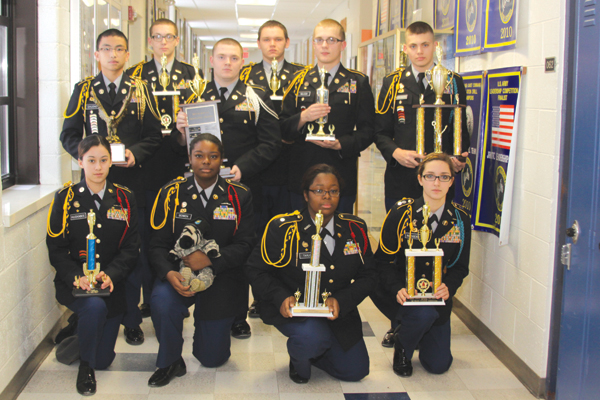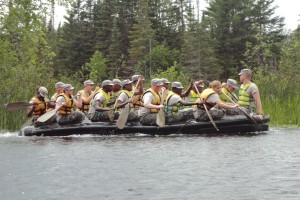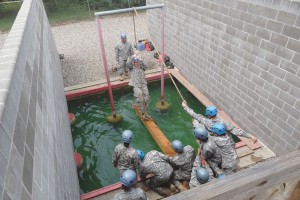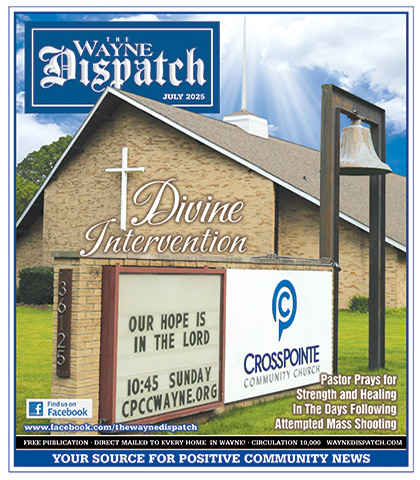JROTC provides life skills and confidence

The JROTC at Wayne Memorial High School has won many awards this year. First row- Shakira Huckabee, Maia Bowen, Raychelle Bowen, Nicole Rodgers. Second row- Douglas Chuong, Nicholas Parraghi, Alexander Wilcox, Michael Alderman. Third row- Nicholas Carter and Dennis Dean.
By Jenny Johnson – It is not a military recruiting program. The JROTC at Wayne Memorial High School was created in 2004 with the mission of motivating young people to be better citizens. They are recognized as leaders and an award winning team at Wayne Memorial High School throughout the community.
“It had the biggest impact on my life as anything else,” said Alexander Wilcox, a senior at WMHS and a member of JROTC.
He struggled his first two years of high school. He had a low GPA and didn’t turn in his work.
“In freshman year it didn’t seem like I would graduate. In second semester sophomore year I got in my head and got more involved in JROTC,” he said.
Soon his GPA went from a 2.3 to 4.0.
In his junior year he joined the competition teams in JROTC and became more confident in class.
“I became more of a speaker in class. I applied lessons I learned to my AP science and English class. It took JROTC to show me how to be better,” he said.
The WMHS JROTC has been part of the 7th Brigade Region since 2010. This includes schools in Michigan, Ohio, Tennessee, Indiana and Kentucky. They are preparing for accreditation and on April 15 members of the brigade from Louisville will be visiting the cadets to do an inspection.
The goal of this and all other JROTC programs is to promote citizenship, develop leadership, improve physical fitness, provide a historical perspective of the military, teach students how to work as a team, communicate, be self-motivated, live drug free and graduate from high school with a plan for the future.
The JROTC program does not benefit when a student joins the military. Their focus is on graduation and success following the high school experience. There is no service obligation following JROTC said First Sergeant (Ret.), US Army Senior Army Instructor Steven LaHaine.
Students who decide to pursue the military after graduation seek out the instructors for more information, LaHaine said.
Many do so to help pay for college tuition.
Nicholas Parraghi had some family issues and his grades dropped and he came close to depression.
“I didn’t want to talk to anyone or be by anyone but I signed up for the class because I wanted to get military information,” he said. “But JROTC showed me that having people around me boosted my morale. I started becoming happier and started improving mentally and physically. Because of JROTC I bettered myself.”
History of JROTC
The United States Army Junior Reserve Officer Training Corps (JROTC) began with six units as a result of the passage of the National Defense Act of 1916. The army authorized high schools to use federal military equipment and an active duty military person was assigned as an instructor.
In 1964 JROTC was opened to other military services and the active duty instructors were replaced with military retirees. Today the instructors are also certified teachers.
In 1972 females were allowed to participate in JROTC.
Currently the program is in 1,710 schools and every state in the nation and American schools overseas. Enrollment in the JROTC program is 273,000 nationwide. JROTC is a free program for students.
“We are self sufficient. We get supplies from the Army,” said LaHaine.
That includes all uniforms, fatigues, materials for competition teams, lodging, meals and transportation for competitions and supplies.
There are 123 students in the JROTC program at Wayne Memorial. They hope to grow the program and have begun visiting Franklin Middle School to talk to students about JROTC.
Classroom skills
JROTC is considered an elective class and counts for a student’s Visual Performing and Applied Arts credit.
LaHaine said the class could also count for a physical education credit soon too.
There are four different Leadership Education Training classes in the JROTC program.
LET 1 is an introduction to JROTC and is for first year students. They learn leadership theories and applications and the foundations for success.
LET 2 focuses on wellness, fitness and first aid. The second year students also learn about geography and environmental awareness, citizenship, American history and government.
LET 3 provides advanced training of previous instruction and LET 4 students work on advanced leader training and serve as mentors for junior cadets.
All of the classes are student led. At the beginning of each class students lead the pledge, the cadet creed and the daily plan. Army Instructor Stanley Lewis and LaHaine oversee the instruction and teach the introductory courses.
Senior Nicholas Parraghi said, “Part of curriculum in the senior class LET 4s is that we teach ourselves. The highest-ranking cadet in each hour conducts the lesson. I conduct teaching for our hour in sixth hour and give homework out.”
Classroom lessons focus on enhancing communication skills, teaching goal setting, recognizing successes and accomplishments, presenting career opportunities, developing responsibility, promoting a disciplined environment, decision making/problem solving skills and physical fitness.
Every Wednesday the cadets wear their uniforms and every Friday is Cadet Challenge and physical training.
“The kids run the program,” LaHaine said. “The Battalion staff runs the staff meeting every week.”
The JROTC is organized as a battalion. Senior Douglas Chuong is the Battalion Commander. The battalion is divided into two companies- Alpha and Bravo. They each have their own company commander and from there each company is divided into platoon and squads with leaders for each group.
“We learn about how to be a leader and how communication works,” Chuong said. “We also learn how the brain works and about first aid. I was able to test out of health class. JROTC covers a lot of subjects.” The lessons they learn in JROTC are used in other classes too.
“A lot of our teachers expect more of us. In English, the teacher stepped out of the class and we (JROTC students) were the ones getting people under control,” said Dennis Dean. “They said you are the role models. We behave the best.”
“They are very well rounded,” LaHaine said. They learn a lot in the program and have a lot of responsibilities.
“They are doing adult stuff,” LaHaine said. “Dean knows the schedule has to be correct if we are going to a competition and we have to have a bus request. When Bowen says we need something we spend real dollars for the cadets. It can be stressful but they learn good life lessons.”
Cadets are chosen for those position based on their leadership skills. Their duties include accountability, keeping their unit members informed, inspecting cadets and leading their units during class, drill and physical fitness training.
“Grades are very important to JROTC. It helps you get promoted. It shows you have discipline and take care of yourself and have self motivation,” said Maia Bowen.
“After school programs should treat students right, do things right, and win. The WMHS JROTC program does all three. Year after year, the program excels in all areas. The program is so successful every year. I don’t think people realize how special these accomplishments are,” said Kevin Weber, principal, WMHS. “The WMHS JROTC program and cadets are an annual point of pride for our school. Every facet of the program, from volunteering, to ceremonies, to competitions, is executed in a dignified and first class manner. 1st Sgt. LaHaine has built a program that offers students at WMHS incredible opportunities. We are fortunate to have such a terrific program and instructor.”
Competitions
“The reason they do so well in the competitions is because of what we do here in the classroom,” LaHaine said.
Besides the daily class work the JROTC has several award winning competition teams.
The Drill Team, Raider Team, Leadership Team, Academic Team and Color Guard. Participation in these teams is all voluntary and the practices and competitions are after school and on weekends.
The Drill Team gets a set of Army regulations commands to memorize and perform in front of a panel of judges. There are Color Guards, armed and unarmed teams.
They won the Michigan-wide championship for drill team and will compete in the National Drill Competition on April 26 in Louisville.
The Raider Team participates in physical fitness tests like a 5K run and Rope Bridge and also a written test, map reading, orienteering and first aid skills test. There will be a Raider competition at Wayne Memorial High School on April 18 with several different high schools competing.
The Leadership Team is in the middle of their second round of competition. If they win they will advance to the finals in Washington D.C. The students have to answer questions about what has been taught in the classroom, current events and the leadership styles of Douglas MacArthur and George C. Marshall.
The Academic Team focuses more on math, English and science questions.
By the numbers
In their 11-year history the WMHS JROTC program has won 452 trophies. The Leadership Team has placed in the Top 20 at the National Leadership competition the past five years.
The Drill Team has placed in Top 16 in the nation for past three years and has been the Michigan Drill Champions seven times.
The Academic Team has been the regional champion for the last four years.
Wayne Memorial JROTC students have been named Top Cadet in the State of Michigan five times.
They are the current State of Michigan Raider champions and the current Brigade Raider champions.
The trophies don’t come without a lot of preparation and hard work though.
LaHaine said, “Gone are the days of everyone gets a trophy. Everyone has an equal opportunity to work their way up.”
The many ribbons on the cadets’ uniforms are for local and national awards.
Chuong said, “I like that cadets are recognized for their achievements. Looking at the uniform you can tell you put effort into things.”
The cadets also put effort into their studies and their future.
“Every one of these cadets is going to college,” LaHaine said. “We don’t ask are you going, we ask where you are going.”
Some choose to enlist in the military or join the reserves to help pay for their college education.
Everyone of the four year cadets have graduated high school, LaHaine said. Two had to stay for a fifth year but they still graduated. These are well-rounded students. They all have plans for either college or military service after graduation, LaHaine said. In addition to JROTC and all of the competition teams and volunteer opportunities, the students also participate in orchestra, band, newspaper, Career Tech classes and many other school activities.
They are also a very close knit and supportive group.
Community service
The community is most familiar with JROTC from the numerous volunteer activities they participate in. These include the FRIENDS: People Helping People project in September. The students help paint the exterior of a senior Wayne resident. They also help with the city’s annual Clean-Up Day and march in Memorial Day and homecoming parades.
The students also help with math and science nights and school fairs at Franklin Middle School and the elementary schools in Wayne-Westland.
At Wayne Memorial, JROTC students serve as ushers and greeters at parent-teacher conferences, concerts and special events.
Each November the JROTC plans and conducts a Veterans Day ceremony near the flagpole at the front of the school. Giving back to and making a difference in their community is another lesson the cadets learn in JROTC.
Future looks bright
Graduates of the WMHS JROTC program are attending Eastern Michigan University, George Mason University, West Point, Citadel and all branches of the military.
Current students plan to attend EMU, Michigan State University and several other colleges to pursue engineering, communications, international affairs, personal fitness, science and chemistry.
Several students are enlisting in the Army reserves or ROTC while attending college. Some are going active duty to the Navy, Marines or Army right after graduation and will work on their college degree while serving their country. They want to be lawyers, engineers, and career military and have fulfilling careers.
They all feel the JROTC program has helped prepare them for their future.
Chuong said, “What I love about JROTC is everyone is motivating each other. People around you will tell you that you can do great. When you can’t find motivation in you they will help.”






